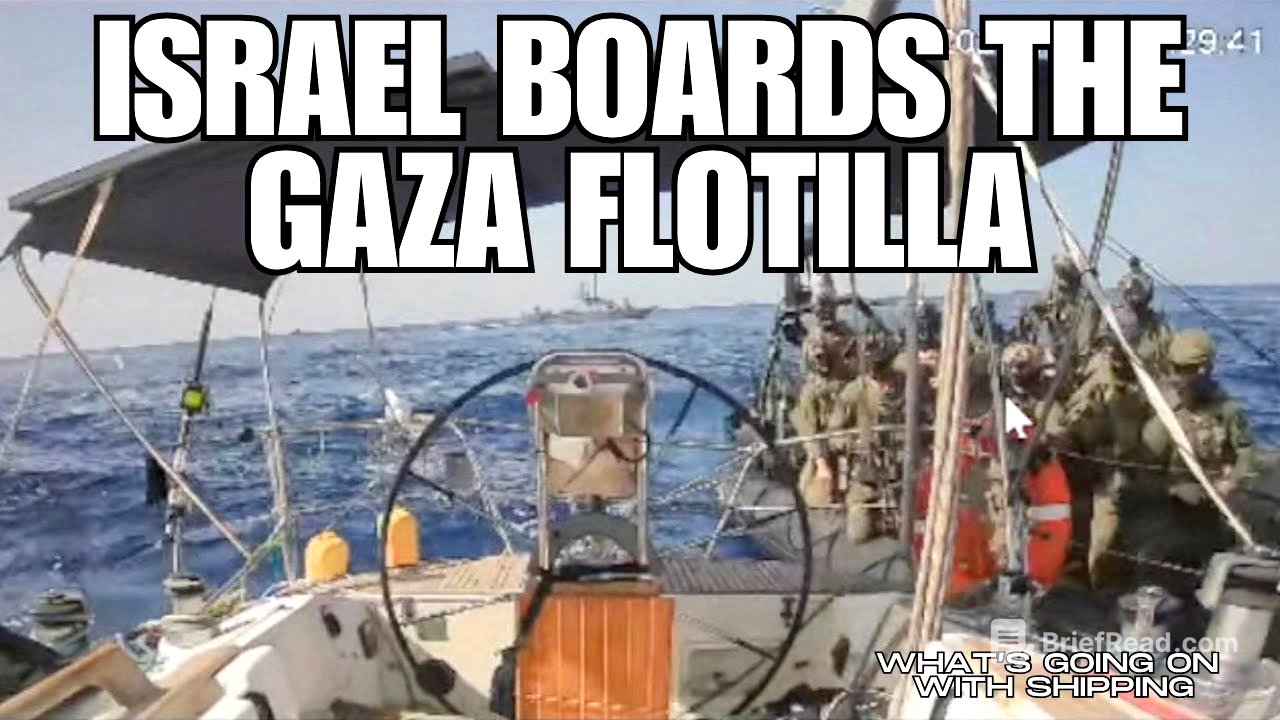TLDR;
The video addresses criticism regarding the speaker's coverage of maritime incidents, specifically concerning an Israeli blockade of Gaza and actions against a flotilla attempting to deliver aid. The speaker clarifies their stance, emphasizing a commitment to calling out violations of international law by any party, including Israel, the Houthis, and the U.S. The speaker highlights the distinction between aid flotillas making political statements and commercial vessels and their crews being targeted, stressing the importance of protecting mariners and maintaining an objective perspective on maritime events.
- The speaker addresses accusations of not covering Israeli actions, clarifying previous discussions on the Gaza flotilla.
- The video distinguishes between political aid flotillas and commercial vessels, emphasizing the speaker's focus on protecting mariners.
- The speaker defends their impartiality, stating a commitment to calling out violations of international law by any nation or group.
Addressing Criticism and Clarifying Stance [0:00]
The speaker begins by addressing a comment accusing them of ignoring the "largest act of piracy in modern history" by Israel, referring to the interception of a flotilla attempting to break the blockade of Gaza. The speaker clarifies that they have previously discussed the Gaza flotilla in earlier videos. They dispute the commenter's claims of torture and the scale of the incident compared to Houthi actions, noting the flotilla consisted of sailboats rather than large commercial vessels.
Analyzing the Gaza Flotilla Incident [1:45]
The speaker references an AP story detailing the interception of the Gaza flotilla by Israeli forces, which led to widespread condemnation. The speaker emphasizes that the vessels involved were largely yachts and sailing boats, not ships capable of delivering substantial aid. While supporting aid delivery to Gaza, the speaker points out the necessity of using established ports like Ashdad in Israel or Elarish in Egypt for significant aid delivery, as the port in Gaza is too small. The speaker views the flotilla as primarily a political statement.
Legal Issues and International Law [5:21]
The speaker addresses the legal issues surrounding the flotilla incident, noting that the seizure of the vessels occurred in international waters beyond the 12-mile limit of Israel and Gaza. While acknowledging Israel's declared blockade around Gaza since 2007, the speaker argues that Israel does not have the right to preemptively stop a crime before it happens and should wait until the vessels cross the 12-mile limit before executing seizures. The speaker suggests that the flag states of the vessels should challenge Israel's actions.
Drone Attacks and Aftermath [7:29]
The speaker highlights that the ships were subjected to drone attacks off the coasts of Tunisia, Sicily, and Cit, raising concerns about the weapons used and calling for investigations by Tunisia, Italy, and Greece. The speaker mentions that warships initially escorted the vessels but later warned them about entering Israeli waters. The speaker notes that Israel deported activists detained from the flotilla, sending them to Greece, and contrasts this with the Houthis' actions, which include killing people and targeting commercial vessels.
Maintaining Impartiality and Protecting Mariners [9:59]
The speaker defends their impartiality, stating a commitment to calling out violations of international law by any nation or group, including the U.S., Israel, and the Houthis. The speaker emphasizes that while the people on the flotilla chose to be there and knew the potential consequences, the crews on commercial vessels attacked by the Houthis did not ask for the attacks. The speaker concludes by reiterating their focus on protecting mariners and maintaining an objective perspective on maritime events.









